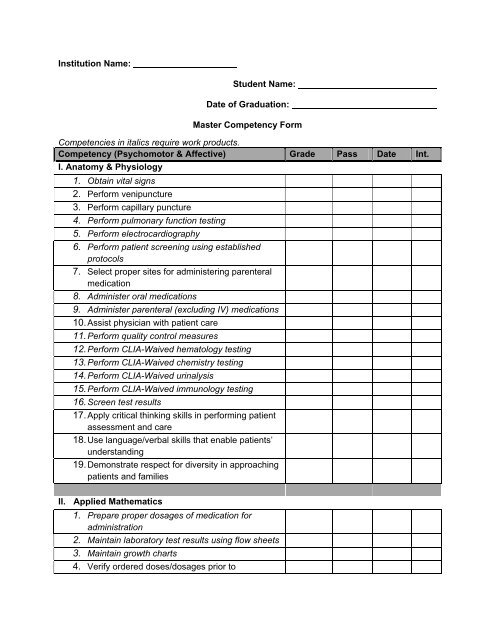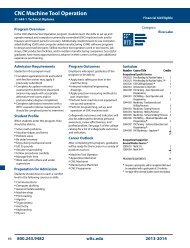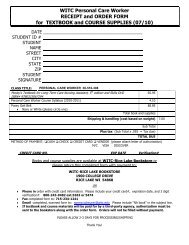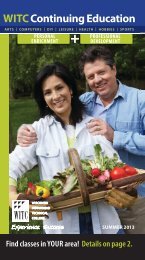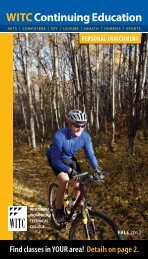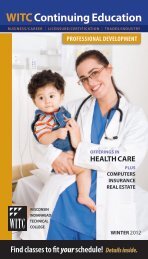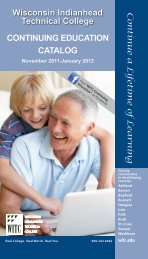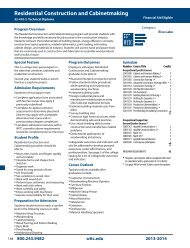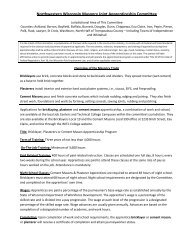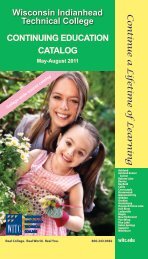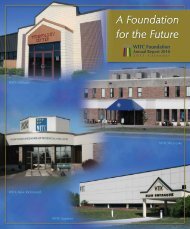Skills Checklist Master Competencies Form
Skills Checklist Master Competencies Form
Skills Checklist Master Competencies Form
Create successful ePaper yourself
Turn your PDF publications into a flip-book with our unique Google optimized e-Paper software.
Institution Name: _____________________<br />
Student Name:<br />
Date of Graduation:<br />
<strong>Master</strong> Competency <strong>Form</strong><br />
<strong>Competencies</strong> in italics require work products.<br />
Competency (Psychomotor & Affective) Grade Pass Date Int.<br />
I. Anatomy & Physiology<br />
1. Obtain vital signs<br />
2. Perform venipuncture<br />
3. Perform capillary puncture<br />
4. Perform pulmonary function testing<br />
5. Perform electrocardiography<br />
6. Perform patient screening using established<br />
protocols<br />
7. Select proper sites for administering parenteral<br />
medication<br />
8. Administer oral medications<br />
9. Administer parenteral (excluding IV) medications<br />
10. Assist physician with patient care<br />
11. Perform quality control measures<br />
12. Perform CLIA-Waived hematology testing<br />
13. Perform CLIA-Waived chemistry testing<br />
14. Perform CLIA-Waived urinalysis<br />
15. Perform CLIA-Waived immunology testing<br />
16. Screen test results<br />
17. Apply critical thinking skills in performing patient<br />
assessment and care<br />
18. Use language/verbal skills that enable patients’<br />
understanding<br />
19. Demonstrate respect for diversity in approaching<br />
patients and families<br />
II. Applied Mathematics<br />
1. Prepare proper dosages of medication for<br />
administration<br />
2. Maintain laboratory test results using flow sheets<br />
3. Maintain growth charts<br />
4. Verify ordered doses/dosages prior to
<strong>Master</strong> Competency Check Sheet<br />
Page 2<br />
administration<br />
5. Distinguish between normal and abnormal test<br />
results<br />
Competency (Psychomotor & Affective) Grade Pass Date Int.<br />
II. Applied Microbiology/Infection Control<br />
1. Participate in training on Standard Precautions<br />
2. Practice Standard Precautions<br />
3. Select appropriate barrier/personal protective<br />
equipment (PPE) for potentially infectious<br />
situations<br />
4. Perform handwashing<br />
5. Prepare items for autoclaving<br />
6. Perform sterilization procedures<br />
7. Obtain specimens for microbiological testing<br />
8. Perform CLIA waived microbiology testing<br />
9. Display sensitivity to patient rights and feelings in<br />
collecting specimens<br />
10. Explain the rationale for performance of a<br />
procedure to the patient<br />
11. Show awareness of patients’ concerns regarding<br />
their perceptions related to the procedure being<br />
performed<br />
IV. Concepts of Effective Communication<br />
1. Use reflection, restatement and clarification<br />
techniques to obtain a patient history<br />
2. Report relevant information to others succinctly<br />
and accurately<br />
3. Use medical terminology, pronouncing medical<br />
terms correctly, to communicate information,<br />
patient history, data and observations<br />
4. Explain general office policies<br />
5. Instruct patients according to their needs to<br />
promote health maintenance and disease<br />
prevention<br />
6. Prepare a patient for procedures and/or<br />
treatments
<strong>Master</strong> Competency Check Sheet<br />
Page 3<br />
7. Demonstrate telephone techniques<br />
8. Document patient care<br />
9. Document patient education<br />
10. Compose professional/business letters<br />
11. Respond to nonverbal communication<br />
12. Develop and maintain a current list of community<br />
resources related to patients’ healthcare needs<br />
13. Advocate on behalf of patients<br />
14. Demonstrate empathy in communicating with<br />
patients, family and staff<br />
Competency (Psychomotor & Affective) Grade Pass Date Int.<br />
15. Apply active listening skills<br />
16. Use appropriate body language and other<br />
nonverbal skills in communicating with patients,<br />
family and staff<br />
17. Demonstrate awareness of the territorial<br />
boundaries of the person with whom<br />
communicating<br />
18. Demonstrate sensitivity appropriate to the<br />
message being delivered<br />
19. Demonstrate awareness of how an individual’s<br />
personal appearance affects anticipated<br />
responses<br />
20. Demonstrate recognition of the patient’s level of<br />
understanding in communications<br />
21. Analyze communications in providing<br />
appropriate responses/ feedback<br />
22. Recognize and protect personal boundaries in<br />
communicating with others<br />
23. Demonstrate respect for individual diversity,<br />
incorporating awareness of one’s own biases in<br />
areas including gender, race, religion, age and<br />
economic status<br />
V. Administrative Functions<br />
1. Manage appointment schedule, using<br />
established priorities<br />
2. Schedule patient admissions and/or procedures<br />
3. Organize a patient’s medical record
<strong>Master</strong> Competency Check Sheet<br />
Page 4<br />
4. File medical records<br />
5. Execute data management using electronic<br />
healthcare records such as the EMR<br />
6. Use office hardware and software to maintain<br />
office systems<br />
7. Use internet to access information related to the<br />
medical office<br />
8. Maintain organization by filing<br />
9. Perform routine maintenance of office equipment<br />
with documentation<br />
10. Perform an office inventory<br />
11. Consider staff needs and limitations in<br />
establishment of a filing system<br />
12. Implement time management principles to<br />
maintain effective office function<br />
Competency (Psychomotor & Affective) Grade Pass Date Int.<br />
VI. Basic Practice Finances cont.<br />
1. Prepare a bank deposit<br />
2. Perform accounts receivable procedures,<br />
including:<br />
a. Post entries on a daysheet<br />
b. Perform billing procedures<br />
c. Perform collection procedures<br />
d. Post adjustments<br />
e. Process a credit balance<br />
f. Process refunds<br />
g. Post non-sufficient fund (NSF) checks<br />
h. Post collection agency payments<br />
3. Utilize computerized office billing systems<br />
4. Demonstrate sensitivity and professionalism in<br />
handling accounts receivable activities with<br />
clients<br />
VII. Managed Care/Insurance<br />
1. Apply both managed care policies and<br />
procedures<br />
2. Apply third party guidelines<br />
3. Complete insurance claim forms
<strong>Master</strong> Competency Check Sheet<br />
Page 5<br />
4. Obtain precertification, including documentation<br />
5. Obtain preauthorization, including documentation<br />
6. Verify eligibility for managed care services<br />
7. Demonstrate assertive communication with<br />
managed care and/or insurance providers<br />
8. Demonstrate sensitivity in communicating with<br />
both providers and patients<br />
9. Communicate in language the patient can<br />
understand regarding managed care and<br />
insurance plans<br />
VIII. Procedural and Diagnostic Coding<br />
1. Perform procedural coding<br />
2. Perform diagnostic coding<br />
3. Work with physician to achieve the maximum<br />
reimbursement<br />
IX. Legal Implications<br />
1. Respond to issues of confidentiality<br />
2. Perform within scope of practice<br />
Competency (Psychomotor & Affective) Grade Pass Date Int.<br />
3. Apply HIPAA rules in regard to privacy/release of<br />
information<br />
4. Practice within the standard of care for a medical<br />
assistant<br />
5. Incorporate the Patient’s Bill of Rights into<br />
personal practice and medical office policies and<br />
procedures<br />
6. Complete an incident report<br />
7. Document accurately in the patient record<br />
8. Apply local, state and federal health care<br />
legislation and regulation appropriate to the<br />
medical assisting practice setting<br />
9. Demonstrate sensitivity to patient rights<br />
10. Demonstrate awareness of the consequences of<br />
not working within the legal scope of practice<br />
11. Recognize the importance of local, state and<br />
federal legislation and regulations in the practice<br />
setting
<strong>Master</strong> Competency Check Sheet<br />
Page 6<br />
X. Ethical Considerations<br />
1. Report illegal and/or unsafe activities and<br />
behaviors that affect health, safety and welfare<br />
of others to proper authorities<br />
2. Develop a plan for separation of personal and<br />
professional ethics<br />
3. Apply ethical behaviors, including<br />
honesty/integrity in performance of medical<br />
assisting practice<br />
4. Examine the impact personal ethics and morals<br />
may have on the individual’s practice<br />
5. Demonstrate awareness of diversity in providing<br />
patient care<br />
XI. Protective Practices<br />
1. Comply with safety signs, symbols and labels<br />
2. Evaluate the work environment to identify safe<br />
vs. unsafe working conditions<br />
3. Develop a personal (patient and employee)<br />
safety plan<br />
4. Develop an environmental safety plan<br />
5. Demonstrate proper use of the following<br />
equipment:<br />
a. Eyewash Lab 1<br />
Competency (Psychomotor & Affective) Grade Pass Date Int.<br />
b. Fire extinguishers Lab 1<br />
c. Sharps disposal containers<br />
6. Participate in a mock environmental exposure<br />
event with documentation of steps taken<br />
7. Explain an evacuation plan for a physician’s<br />
office<br />
8. Demonstrate methods of fire prevention in the<br />
healthcare setting<br />
9. Maintain provider/professional level CPR<br />
certification<br />
10. Perform first aid procedures<br />
11. Use proper body mechanics
<strong>Master</strong> Competency Check Sheet<br />
Page 7<br />
12. Maintain a current list of community resources<br />
for emergency preparedness<br />
13. Recognize the effects of stress on all persons<br />
involved in emergency situations<br />
14. Demonstrate self awareness in responding to<br />
emergency situations


